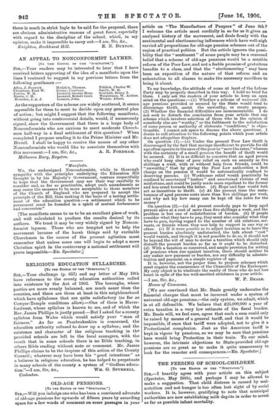OLD-AGE PENSIONS.
[To THE EDITOR OF THE " SPECTATOR:1 Sin,—Will you indulge one who has been a convinced advocate of old-age pensions for upwards of fifteen years by according space for a few words of comment on some passages in your article on " The Manufacture of Paupers " of June 9th ? I welcome the article most cordially in so far as it gives an analysed history of the movement, and deals firmly with the sentimental and electioneering influences which have well-nigh carried all propositions for old-age pension schemes out of the region of practical politics. But the article ignores the possi- bility that the " sentiment " of some people may be a reasoned belief that a scheme of old-age pensions would be a sensible reform of the Poor Law, and not a feeble promise of gratuitous benefits to a class, and that the " electioneering " may have been an exposition of the nature of that reform and an exhortation to all classes to make the necessary sacrifices to bring it about.
To my knowledge, the attitude of some at least of the Labour Party may be properly described in this way. I hold no brief for them. I only ask the readers of your article to keep an open mind on the questions :—(1) Whether a scheme of universal old- age pensions provided or secured by the State would tend to discourage thrift, assist the unworthy, or create paupers. (2) Whether the financial difficulties are insurmountable. I do not seek to disturb the conclusion from your article that any scheme which involves selection of those who in the opinion of somebody else are "worthy," or the fulfilment to the satisfaction of some person or authority of elaborate "conditions," is objec- tionable. I cannot ask space to discuss the above questions. I desire to call attention to the following points which your article does not altogether displace.
On question (1).—(a) Under the present Poor Law thrift is discouraged by the fact that savings insufficient to provide for old age often operate in the eyes of the poor to "save the rates," whereas with the certainty of a small pension the benefit of thrift would be secured. (b) It is so difficult to conceive that an aged person who could keep clear of poor relief on such an annuity as five shillings a week, with or without help from friends, could be "unworthy," that by giving the Poor Law authorities a first charge on the pension it would be automatically confined to deserving persons. (c) Workhouse relief would practically be confined to ascertained "loafers" and ascertained victims of real misfortune, and could be justly made more repellent to the former and less cruel towards the latter. (d) Hope and fear would both act as incentives to thrift. (e) At the present time the main- tenance of aged persons costs more than five shillings per week, and why not try how many can be kept off the rates for the money ?
On question (2).—(a) At present somebody pays to keep aged persons alive at a cost of more than five shillings a week, and the problem is but one of redistribution of burden. (b) If people consider what they have to pay, they must also consider what they have to gain, having regard to the number of old relations, ser- vants, or friends whom they now help to support in one way or other. (c) If it were possible so to adjust taxation as to leave the present burden absolutely undisturbed, the talk about " cost " would vanish, and though it is not possible to do so, it should not be beyond the wit of man to devise a taxation which should only disturb the present burden so far as it ought to be disturbed. (d) With a taxation so conceived, and ample provision for settinc, off pensions when due against taxation, there should neither be any unfair new payment burden, nor any difficulty in adminis- tration and payment on a simple register of age.
It is, however, not the proper time to propose schemes which must require the concurrence of the Chancellor of the Exchequer. My only object is to vindicate the sanity of those who do not lose heart in spite of the too well-merited strictures in your article.
House of Commons.
[We are convinced that Mr. Beale greatly underrates the financial charges that must be incurred under a system of universal old-age pensions,—the only system, we admit, which is at all defensible. We believe that £25,000,000 a year of extra taxation is a very low estimate of the fiscal burden.
Mr. Beale will, we feel sure, agree that such a sum could only be raised by means of a general tariff, and that it would be impossible, if once that tariff were adopted, not to give it a Protectionist complexion. Just as the American tariff is kept in vigour by pensions, so we may be sure that pensions here would bring Protection in their train. To our mind, however, the intrinsic objections to State-provided old-age pensions are so great as to make it quite unnecessary to look for the remoter evil consequences.—ED. Spectator.]










































 Previous page
Previous page